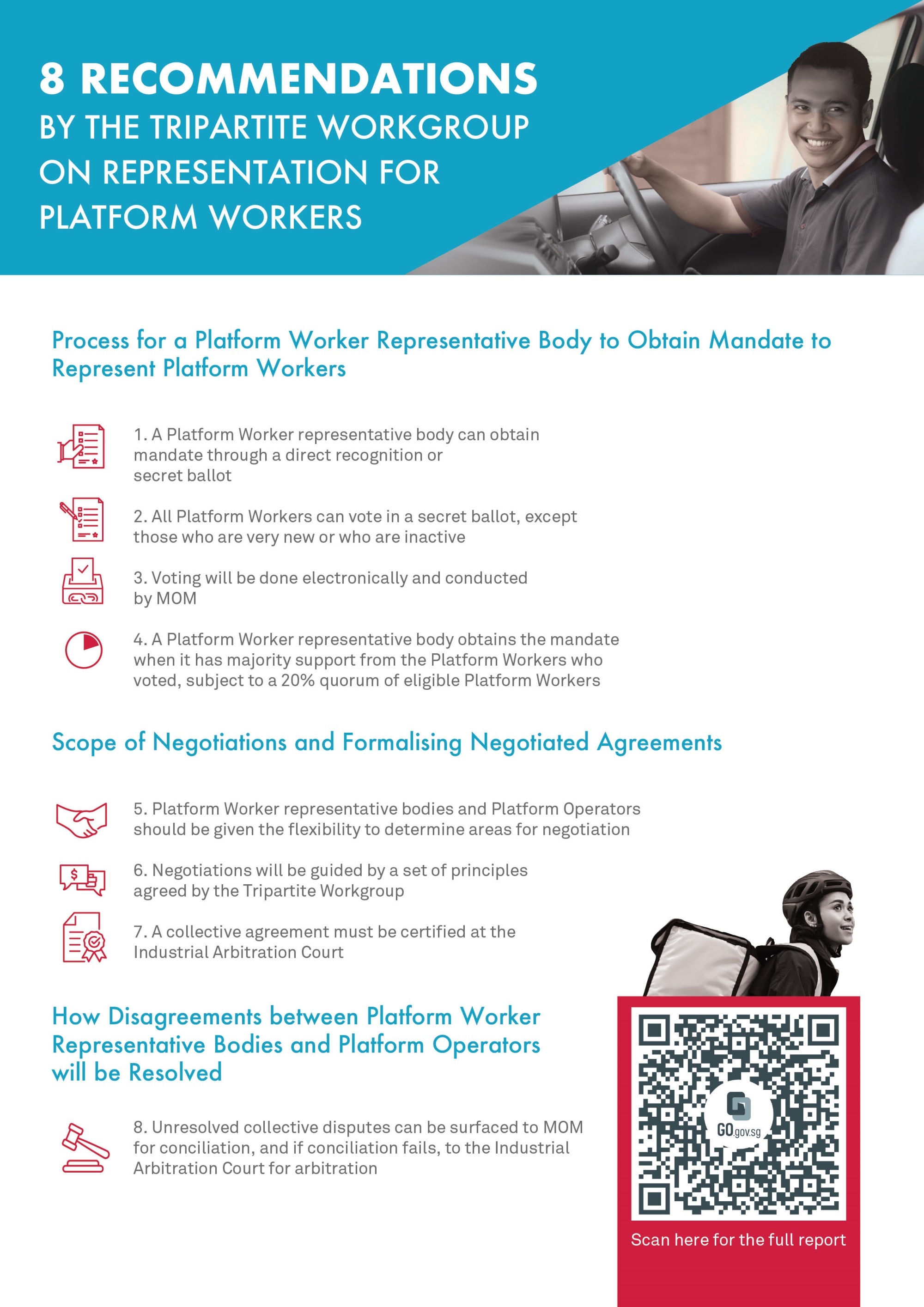From next year, platform workers—delivery workers, private-hire car drivers, and taxi drivers who utilise online platforms—can set up representative bodies to negotiate for their interests and settle disputes with platform operators such as Grab, Lalamove, and foodpanda.
A Tripartite Workgroup (TWG), which was set up to look into how the interests of platform workers can be better represented, has put out eight recommendations on how it can be achieved.
All eight have been accepted by the government, announced the Ministry of Manpower (MOM) on Wednesday (Jul. 12).
Broadly, the eight recommendations cover the following areas:
- How a representative body can be set up among platform workers.
- What can be negotiated between the representative body and platform operators, as well as how the negotiations must take place.
- How disagreements between the representative body and platform operators must be resolved.
Current situation for platform workers
Currently, NTUC associations—the National Taxi Association, National Private Hire Vehicles Association and National Delivery Champions Association—serve as the voice of platform workers in the taxi, ride-hailing and delivery sectors respectively.
These associations advocate for better earnings, welfare and work prospects by taking workers' feedback and concerns and then engaging platform operators.
However, there is no process to determine whether a representative body has the mandate to be the voice of the platform workers.
According to NTUC, while trade unions usually play the role of representing employees' interests, platform workers are not recognised as employees under the Employment Act.
As such, platform workers cannot form unions to collectively negotiate for their rights.
They do not have the same legislative powers as trade unions to represent them, and hence face challenges in resolving disputes and during negotiations for workplace issues pertaining to payment terms, job allocation, health and safety.
Key takeaways from the recommendations
The first key takeaway from TWG's recommendations is that platform workers can set up a representative body to advance their welfare.
This can be done by either signing a Memorandum of Understanding with the platform operator directly or holding a secret ballot.
Working directly with the operator is a preferred approach because it sets a better tone for collaborative relationship, said the workgroup.
Next, with the representative body set up, platform workers will have an avenue to negotiate matters such as contractual terms and working
conditions.
However, what can be negotiated and what is non-negotiable must be agreed upon between the representative body and the operator. If not, MOM will step in.
Negotiations must be guided by a set of principles, such as mutual commitment to the business success of platform operator and the welfare of workers, and access to fair and timely avenues of recourse.
Lastly, MOM can step in to handle unresolved collective disputes between the representative body and the operator. If that fails, the matter will go to the Industrial Arbitration Court.
Here are the full eight recommendations:

Recommendations will be implemented in 2024
With the new recommendations by TWG, there will be a clear framework for a representative body to seek mandate to represent the platform workers.
Platform operators will also benefit from more clarity on the rules for representation.
Additionally, there will be a regulated pathway for disagreements between platform worker representative bodies and platform operators to be resolved.
MOM said that the government will work closely with tripartite partners, platform workers, and platform operators to implement TWG's recommendations from the second half of 2024.
You can read the full workgroup report here.
"Significant milestone"
In a statement on Jul. 12, NTUC's Secretary-General Ng Chee Meng said that the government's acceptance of the recommendations is a "significant milestone for all platform workers".
He added:
"NTUC has been advocating their interests and engaging them to understand their challenges over the years. As what could be the first-in-the-world tripartite collaboration for platform workers, the implementation of this framework paves the way for NTUC and our affiliated associations to officially represent them.
We seek to work closely with our partners and platform workers, to champion them in the areas of better wages, welfare and work prospects. We want to thank all platform workers who have placed their trust and journeyed with us in making this possible."
Top image via foodpanda & Grab.
If you like what you read, follow us on Facebook, Instagram, Twitter and Telegram to get the latest updates.



